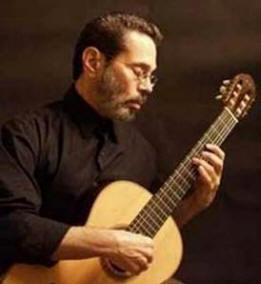Home
Blog
Composers
Musicians
Black History
Audio
About Us
Links
Composers:
Adams, H. Leslie
Akpabot, Samuel Ekpe
Alberga, Eleanor
Bonds, Margaret Allison
Brouwer, Leo
Burleigh, Henry Thacker
Coleridge-Taylor, Samuel
Cunningham, Arthur
Dawson, William Levi
Dede, Edmund
Dett, R. Nathaniel
Elie, Justin
Ellington, Edward K. "Duke"
Euba, Akin
Garcia, José Mauricio Nunes
Hailstork, Adolphus C.
Holland, Justin
Jeanty, Occide
Johnson, James Price
Joplin, Scott
Kay, Ulysses Simpson
Khumalo, Mzilikazi
Lambert, Charles Lucien, Sr.
Lambert, Lucien-Leon G., Jr.
Lamothe, Ludovic
Leon, Tania
Moerane, Michael Mosoeu
Perkinson, Coleridge-Taylor
Pradel, Alain Pierre
Price, Florence Beatrice Smith
Racine, Julio
Roldan, Amadeo
Saint-Georges, Le Chevalier de
Sancho, Ignatius
Smith, Hale
Smith, Irene Britton
Sowande, Fela
Still, William Grant
Walker, George Theophilus
White, José Silvestre
Williams. Julius Penson
AfriClassical Blog
Companion to AfriClassical.com
Guest Book
William J. Zick, Webmaster,
wzick@ameritech.net
©
Copyright 2006 - 2022
William J. Zick
All rights reserved for all content of AfriClassical.com
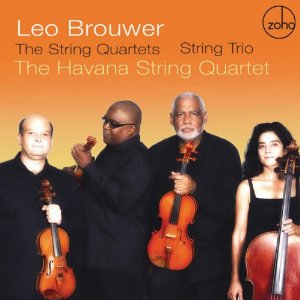
Leo Brouwer: The String Quartets,
The String Trio
Havana String Quartet
Zoho Records 201108 (2011)
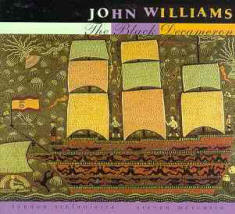
The Black Decameron
John Williams, guitar
London Sinfonietta
Steven Mercurio,
Conductor
Sony 63173 (1998)
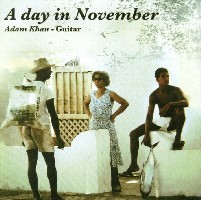
A day in November
Adam Khan, guitar
Dinmore DRD052
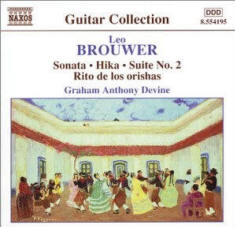
Leo Brouwer: Sonata et.al.
Granham Anthony Devine, guitar
Naxos. 8.554195 (2003)
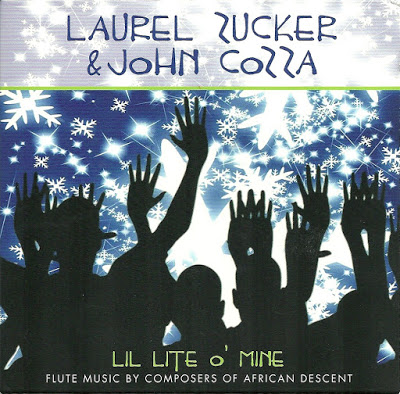
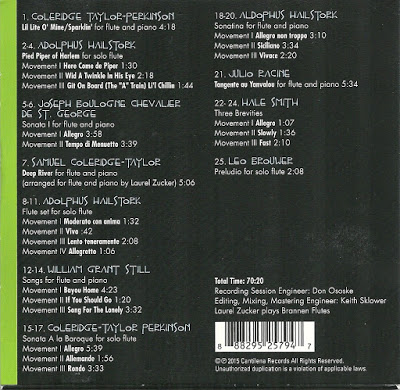
|
Home ->
Composers -> Brouwer, Leo
Français
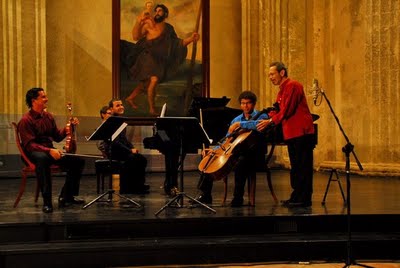
Leo Brouwer conducts
the concert Norteamerica
y su música (North America and Its Music),
which focused on works of Jewish composers and was held in
Havana on August 4, 2011. Performers were: Fernando Muñoz,
violin; Alejandro Martínez, cello; and Leonardo Gell, piano.
Audio Samples:
1 GHA 126.025 (1998); Concierto de Volos - Leo
Brouwer
/ Concierto de Aranjuez - Joaquin Rodrigo /
Serenade, Op. 50 - Malcolm Arnold; Costas Cotsiolis,
guitar; Orquesta de Cordoba; Leo Brouwer, Conductor
Concierto de Volos
a Aeolian Serenade
b The Sphynx
c Bacchus Dance in Agria's Beach
2 GHA 126.046 (2001);
Three Double Concertos;
Costas Cotsiolis and Isel Rodriguez
Trujillo, guitar;
Orquesta
de Cordoba; Leo Brouwer, Conductor; Concierto para
guitarra, violin y arcos "Omaggio
a Paganini"
a
Pasacalle
b Interlude
c
Concerto grosso
1 Birth
The Afro-Cuban composer, classical guitarist and conductor we
now know as Leo Brouwer was named Juan Leovigildo Brouwer when
he came into the world in Havana, Cuba on March 1, 1939. His
enormous influence on guitar music in particular and classical
music in general is demonstrated by more than a hundred
recordings on which he has played, composed or conducted. Brouwer's compositions reflect classical, Afro-Cuban, jazz and
avant-garde influences. His many film scores have brought his
music to the attention of a huge audience around the world. Brouwer's influence in his native country results in part from
the important positions he has held in Cuban music institutions.
2 An Early Start
Young Leo's father, Juan Brouwer, was a doctor and an amateur
guitarist. Leo first learned music from his father and his aunt,
Caridad Mezquida. His great-uncle was the well-known composer
and pianist Ernesto Lecuona. Leo began playing the guitar
himself at age 13. His first significant teacher was Isaac
Nicola, a virtuoso guitarist who also composed for his
instrument and arranged the music of others for guitar. Leo was
only 17 when he made his own professional debut. Early
compositions include Prelude (1956) and Fugue (1959), both
influenced by Bela Bartok and Igor Stravinsky. His academic
training took place in the U.S., at the Julliard School of Music
and the Hartt College of Music, where his major subject of study
was composition.
3 Positions in Cuba
After completing his music education, Brouwer returned to Cuba. There he immediately became a major figure in his country's
music establishment. From 1960 to 1961 he was the Music Advisor
to the National Radio and Television Company in Havana. In 1960, Brouwer became Director of the Instituto Cubano de Arte e
Industria Cinematograficos [Cuban Institute of Film Arts and
Industry]. That position is one of the reasons that the composer
has written more than 30 film scores, some of which were
box-office hits around the world. Brouwer was also a Professor
of Composition at the Conservatorio Nacional [National
Conservatory] from 1961-67.
4 Style of Composing
Steven Thachuk has written the liner notes for the CD Brouwer:
Guitar Music, Vol. 2, Naxos 8.554553 (2001). He notes:
|
As a composer, however, Brouwer is
primarily self-taught, and his development
as a creator of music can be traced
logically through three stages of
compositional style. His first period began
in 1954 with a series of pieces that
explored the possibilities of the guitar.
Brouwer makes free use of musical
materials from his Cuban roots. Pieces
with traditional forms such as fugue are
present alongside works which
incorporate the vital rhythmic energy of
his homeland.
In 1961, Brouwer attended the Warsaw
Autumn festival in Poland, and came into
contact with the music of avant-garde composers such as Penderecki, Baird and
Bussotti. By 1968, he had assimilated
these ideas into an entirely unique and
personal style.
The composer has referred to his current
compositional style as "national Hyper-Romanticism". His piece for guitar
orchestra, Acerca del sol, el aire y la sonorisa (1978), was the first in this
mature phase. It displays all the
characteristics of his new style: a return
to Afro-Cuban roots mixed with elements
of tonality, traditional form, programmatic
gestures, and minimalism.
|
5 Concerts and CDs
The liner notes for Brouwer's Concierto de Volos [Volos
Concerto] (28:01), GHA Records 126.025 (1998), provide an
overview of his many live performances and recordings:
|
He has been heard as both composer and
classical guitarist at virtually every major
music event in the world, and is also the
author of the famous work Cancion de gesta (Epic Poem), recorded and played
by the most important orchestras in the
world. His discography is comprised of
over a hundred commercial recordings,
and his works have been recorded by
personalities, such as John Williams,
Julian Bream, Franz Bruggen, Harry
Sparnay, as well as musical centers such
as The Toronto Festival, the BBC Chamber
Orchestra and the Liège Festival, among
others. In 1993, he composed the music for Alfonso Arau's internationally
acclaimed, award winning Like Water for
Chocolate.
|
6 Diverse Output
As a composer, Brouwer has not limited himself to music for
guitar. The liner notes for Cuban Landscape: The Music of Leo Brouwer, Koch 3 1174 2 (1994), show just how diverse his output
has been:
|
Brouwer also has an extensive catalogue
of symphonic, chamber and instrumental
works, including music for solo cello,
piano, percussion, a flute concerto, a harp
concerto...
|
7 Latin Grammy
Leo Brouwer initiated the
Havana String Quartet in 1980. It recorded
Leo Brouwer: The String
Quartets and String Trio
on the
ZOHO Music label as ZM 201108 (2011). As Leo Brouwer writes:
|
This recording won the
LATIN GRAMMY for Best Classical Recording in November
2010! |
The disc was released to the
public in August 2011.
8 Quartets & Trio
Leo Brouwer writes in the liner notes that he wrote the First
Quartet (19:54) in 1961 and dedicated it
In Memory
of Bela Bartok. The
work won the composer First Prize in Cuba's National Composition
Competition in 1963. Brouwer wrote the Second Quartet
(6:17) in 1968, and called it:
|
Rem Tene Verba
Sequentur (Know the Matter and the Word will
follow). |
The composer wrote the String
Trio in 1959 while he was a student at Juilliard. The Fourth
Quartet (13:11) dates from 2007 and is a world premiere
recording. The Third Quartet (20:53) dates from 1991-97 and has
four movements:
Ritual Voice for New
Year's Eve
(5:11)
Through the
Body of the Wind
(5:07)
Impossible
Dance
(6:04)
The Rhythm
of the Night Changed
(4:31). |
9 Conductor
As a conductor, Brouwer is well-traveled and has been much
appreciated by his audiences. Among the ensembles he has led are
the Berlin Philharmonic Orchestra, the Scottish National
Symphony Orchestra, the BBC Chamber Orchestra and the Mexico
National Symphony Orchestra. Brouwer has been General Manager of
the Cuban National Symphony Orchestra. Since 1992
he has led the Orquesta de Cordoba. He is also founder and
director of the Cuban Guitar Competition and Festival, held
every other year.
10 Cordoba
Leo
Brouwer is founder of the Orquesta de Cordoba
[Cordoba Orchestra], an accomplished symphony orchestra in the
Andalusia region of Spain. The liner notes for the world
premiere recording of his Concierto de Volos, GHA Records
126.025 (1998), tell how the ensemble was founded by Brouwer and
took shape in his experienced hands:
|
The Orquesta de Cordoba was created in
1992 by the regional Council of Andalusia
and the municipality of Cordoba. Artistic
direction of the orchestra was entrusted to
the composer and conductor Leo Brouwer.
Among the motives for his designation
also as the conductor of this orchestra, the
Orquesta de Cordoba was pleased to
remind and underline the master's vast
experience, his international prestige and
especially the enthusiasm with which he
assumed under all aspects the enormous
mission involved in the creation of a new
orchestra. |
Habanos News
published an interview with Leo Brouwer on February 22, 2011 in
which he gave an overview of his time with the Orquesta de
Cordoba:
|
I
founded the Orchestra of Cordoba, in Andalusia, and I
was its leading conductor for almost 10 years, which
brought a lot of happiness to my life, especially in my
executive role. It is a thousand-year-old beautiful
city, but it didn’t have a strong history of classic
music or symphonic orchestras |
|
11
3 Composers
GHA Records and the Orquesta de Cordoba assembled a program of
three soloists and three composers for the 1998 world premiere
recording of Brouwer's Concierto de Volos. Guitarist Costas
Cotsiolis begins the program with Brouwer's work. Next comes the
renowned Concierto de Aranjuez (22:30) by the Spanish composer
Joaquin Rodrigo. The guitar soloist is Scott Tennant. Rounding
out the program is Serenade, Opus 50, (5:26) a brief piece by
the British composer Malcolm Arnold, performed by guitarist Odair Assad. The liner notes put the CD in context:
|
This recording represents an important step for GHA in a first time collaboration
with Leo Brouwer and the Orquesta de
Cordoba bringing together three great
soloists in an original program. Due to
the fact that the piece was composed in
his honor, it is logical that Costas Cotsiolis
should be the first musician to record Leo
Brouwer's Concierto de Volos. This concerto
makes part of the complete solo guitar works
by Leo Brouwer which Costas Cotsiolis has
been entrusted with at GHA. |
12 Concierto de Volos
Brouwer has produced several concertos for classical guitar,
including Concierto de Volos [Volos Concerto], which was his
sixth. he world premiere recording by GHA Records of Belgium
features guitarist Costas Cotsiolis and the Orquesta de Cordoba
under the baton of Leo Brouwer. The liner notes explain the
origin of the work, its name and its makeup:
|
The Concierto de Volos, Leo Brouwer's
sixth guitar concerto, was composed in
1996 at the request of Costas Cotsiolis. It
was therefore dedicated to this talented
Greek artist. The concerto was premiered
in Volos during the summer of 1997. "As
it is the case for most of the guitar
concertos that preceded it", says Leo
Brouwer, "the Concierto de Volos reflects
more the personality of the person to
whom it is dedicated than the countryside
or local culture to which it seems to refer
(the Concierto elegiaco is a portrait of
Julian Bream, like the Concierto de Toronto was written in the image of John
Williams).
One finds reminders and citations of the
atmospheres and themes of the Black Sea
and the Mediterranean Sea in the
thematic material. I used a theme in the
finale that both the Greeks and the
Bulgarians respectively claim to have
fathered. As for the slow motifs, they are
original yet still in the Byzantine spirit. "
|
13 Newest Concertos
The composer's sheet music is available from the Chester Novello
company. Recent guitar concertos of Brouwer are listed at the
Web site www.chesternovello.com
:
|
In recent years, Brouwer has continued
his unique series of guitar concertos (Concierto No. 7 La Habana, Concierto No.
8 Concierto Cantata de Perugia, and Concierto de Benicassim) as well as
writing for a rich variety of other
ensembles, most notably his horn trio of
2002, Pictures of Another Exhibition. His
latest concerto for guitar is his Double
Concerto (Book of Signs)... |
14
Cuban Landscape
Cuban Landscape: The Music of Leo Brouwer is a collection of
several brief guitar compositions, Koch Schwann 3 1174 2 H1
(1994). The guitarists are Robert Beer, John Draper, Carl Ljungstrom and Steven Patterson. The liner notes relate:
|
The Musica Incidental Campesina -
published in 1978 in Cuba - and the Four Micropiezas - subtitled
Hommage a Darius Milhaud - are very popular with
guitar duos.
...
Cuban landscape with rain for guitar
quartet is part of the series of Cuban landscapes, the others being Cuban landscape with rhumba and Cuban
landscape with carillons for solo guitar. The six short
preludes of Preludios Epigrammaticos explore a mood suggested by a line of poetry taken from
Poemas de Amor by the
Cuban poet Miguel Hernandez...
...
Parabola, stylistically from Brouwer's
avant-garde period, is in seven sections,
but is played continuously.
...
Cancion de Cuna (subtitled Berceuse) and Ojos are based on themes by Grenet and Roig, two popular
Cuban composers. Danza del Altiplano is subtitled Piece
Latino-Americano No. 1, and Elogio de la
danza is probably
Brouwer's most popular guitar piece and has been recorded and choreographed
many times. It is intended as a homage to
Igor Stravinsky. El Decameron Negro
consists of three
parts...
|
15 Guitar Music, Vol. 2
The Greek guitarist Elena Papandreou has recorded eight of
Brouwer's compositions for solo guitar on Brouwer: Guitar Music,
Vol. 2, Naxos 8.554553 (2001). In the liner notes Steven Thachuk
first discusses the earliest composition, Canticum (5:54):
|
Canticum (1968) was the first guitar piece
that Brouwer had written since Elogio de
la danza [Praise of the Dance] in 1964. It
was composed at the request of the Cuban
guitarist, Carlos Molina, who was
preparing a recital of Brouwer's pieces. |
Thachuk observes that the work introduced the composer's ".. new
language of metre, dynamics and timbre." It has two sections,
Eclosion and Ditirambo. A second piece, from 1971, is
La Espiral
eterna [The Eternal Spiral] (7:38)), which Thachuk says is "an
instrumental tour-de-force". It alludes to spirals ranging from
the largest galaxies in the universe to the tiniest organisms on
Earth.
Thirdly, Parabola (7:55), written in 1973, is intended as a
musical counterpart to the painting of the artist Paul Klee. The
fourth title is a 1974 work entitled Tarantos (5:55) which
suggests a flamenco dance called the taranta. The liner notes
continue:
|
The first solo guitar piece of the "national
Hyper-Romantic" style was El Decameron
Negro (1981) [16:24], composed for Sharon
Isbin. The work consists of three ballads
based upon El Decameron negro by the
anthropologist Leon Frobenius. The book
is based on African legends which were
arranged into a narrative about a warrior
who wished to be a musician. The three
movements display the new Brouwer style
with colour, excitement and poetry.
|
Another work composed in 1981 is Preludios Epigramaticos
[Epigrammatic Preludes] (11:44). The liner notes tell us that
Variations on a Theme of Django Reinhardt (12:03) is from 1984
and is Brouwer's only solo guitar piece containing a theme and
variations. It is based on Nuages, a jazz composition by
Reinhardt. Paisaje cubano con tristeza [Cuban landscape with
sadness] (5:40) is a 1996 work which continues the Cuban
Landscape series found on the Koch Schwann recording above.
16 Guitar Music, Vol. 3
Graham Anthony Devine is a classical guitarist who was born in
England but emigrated to Brazil in his teens. He is the
guitarist on Brouwer: Guitar Music, Vol. 3, Naxos 8.554195
(2003). The liner notes are by the performer:
|
The sonata [15:32] which begins this disc
was written in 1990 for Julian Bream, who
gave its first performance the following
year.
...
Tres Piezas Latino-Americanas [Three
Latin American Pieces] [11:44] are based
on various songs from South America.
...
Leo Brouwer composed his Suite No. 2 [6:14] as an adolescent. His Cuban roots
are heard in the outer movements, while
the central movement is suggestive of
neo-classical Russian composers such as
Shostakovich, Stravinsky and Prokoviev.
Brouwer enjoyed a close relationship for
many years with the Japanese composer
Toru Takemitsu. Hika: In Memoriam Toru
Takemitsu [7:24] was completed shortly
after Takemitsu's death.
...
An Idea [2:52] is a short piece written in
honour of the seventieth birthday of the
Canadian guitar teacher, Eli Kassner.
...
Cuban Landscape with Carillons [6:25] is
a fascinating piece which uses repeated
fragments, harmonics and some special
effects...
...
The religion of the Yoruba was brought to
Cuba by African slaves and Orishas is the
Yoruban word for Afro-Cuban gods and
goddesses. Brouwer's Rito de los Orishas
(Rite of the Orishas) [15:56] is a dark,
powerful, rhythmic work in two
movements.
...
Un Dia de Noviembre (A Day in
November) [4:27] was composed for a
black and white film made by Humberto
Solaz in 1967. |
17 El caminante
Sonata del caminante was
written in 2007 for the legendary guitarist Odair Assad. It was
published by
Ediciones
Espiral Eterna and was given its recorded premiere on a 2010 GHA
Records disc, El
caminante.
The
movements are:
Visión de la Amazonia, El gran sertão, Danza festiva,
and
Toccata Nordestino.
The
composer writes in the liner notes:
|
Sonata del
caminante
was composed
in a few days, at once for Odair Assad. Composition is a
birth with its pain, its effort and its joy but, in this
case, everything was organic. Thinking and doing were
one and the same. An impossible challenge for any guitar
virtuoso is something common for Odair. This contributed
to the fluidity of the sound in the
Sonata.
The
Sertão
and the great forest intersect in waterfalls of sounds
distant and static, calmed like the plain. Thematically
you won’t find in the
Sonata del
caminante
sweet melodies
nor gracious
batucadas;
if
I intended something, it was 'intensity.' I hope to have
succeeded. |
18 Arranger
Brouwer enjoys arranging the classical and popular music of
other composers for classical guitar. He has arranged Scott
Joplin's The Entertainer and Elite Syncopations for solo guitar. His recorded Beatles arrangements include an album entitled
From
Yesterday to Penny Lane: Seven Songs After The Beatles, Arc
Music 1247 (1994). The songs were written by John Lennon and
Paul McCartney. Guitarist Flavio Cucchi accompanies the Tessarin
Chamber Orchestra led by Enrique Ugarte, Conductor.
19 Additional CDs
Here are a few more of the many CDs of
the music of Leo Brouwer:
Musique Cubaine pour guitare classique (Cuban Music for
Classical
Guitar); Sonata (13:37); Marco Diaz Tamayo, Guitar; Voice of
Lyrics MM 111
A Day in November; Adam Khan, Guitar; Dinmore DRD052
Guitar Concerto No. 5, "Helsinki": Timo Korhonen, Guitar;
Tampere Philharmonic Orchestra; Tuomas Ollila, Conductor; Ondine
979 (2002)
20 Resources
A Close Encounter with Leo Brouwer
(www.musicweb-international.com/brouwer/rodolfo.htm)
- Lengthy interview of the
composer by Rodolfo Betancourt.
Leo Brouwer
(http://www.musicweb-international.com/brouwer/) - Article by Andy Daly, Classical Music on the Web -
Biography and extensive list of works for guitar.
Leo Brouwer at Chester Novello (www.chesternovello.com/composer/183/main.html) - The career and sheet music of
Leo Brouwer at Web site of his music publisher.
This page was last updated
on
March 5, 2022
|







